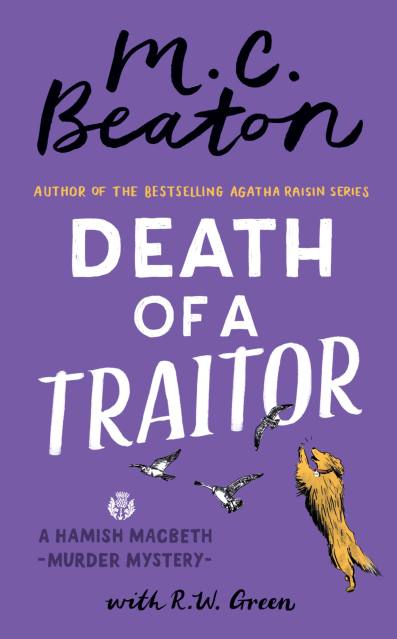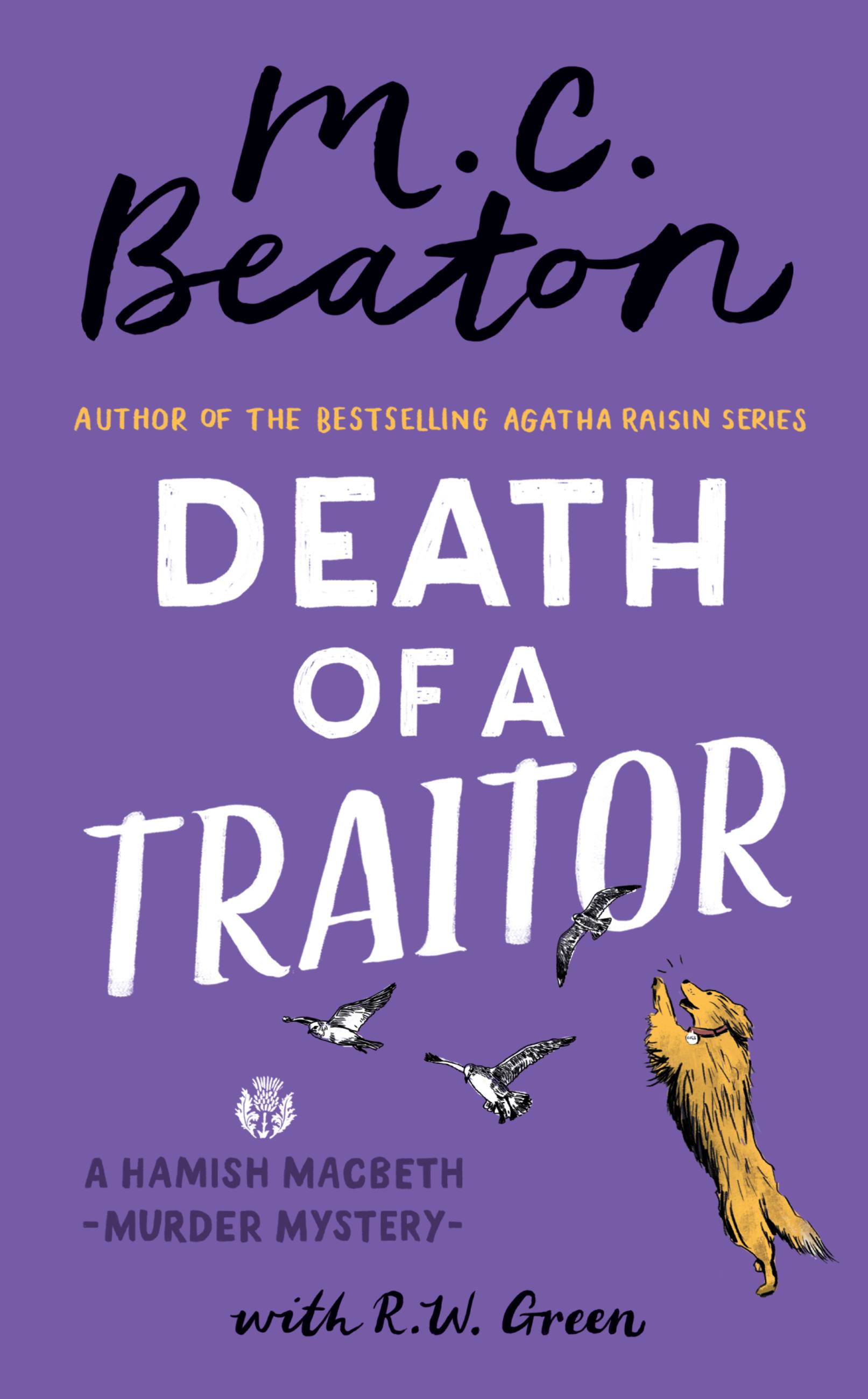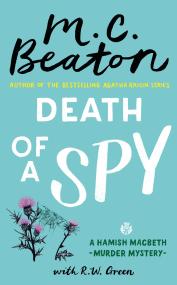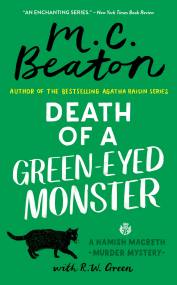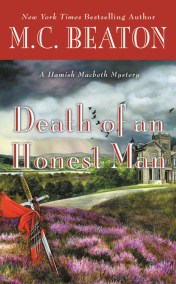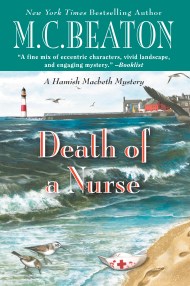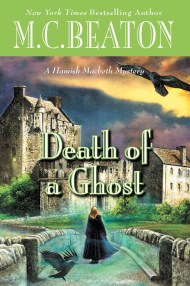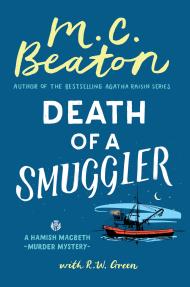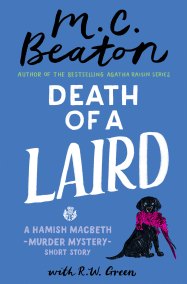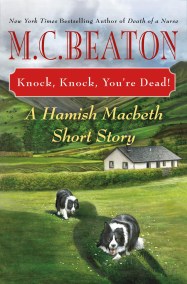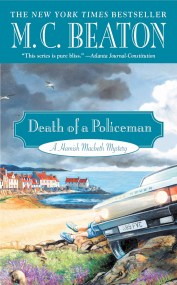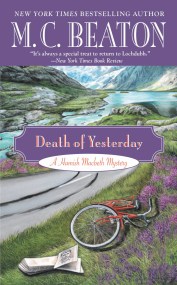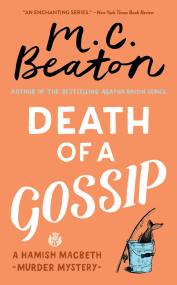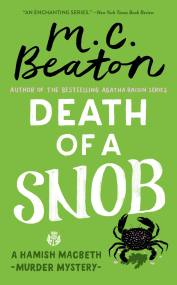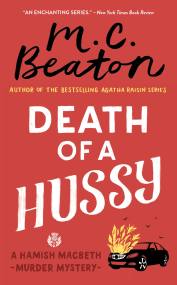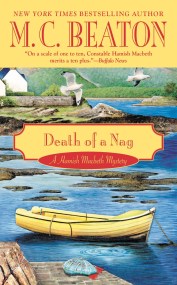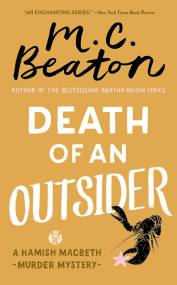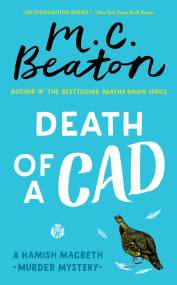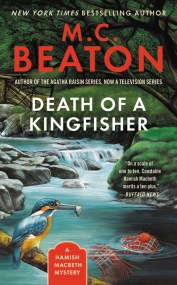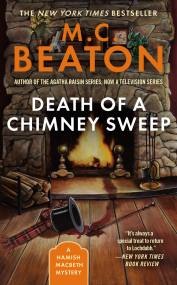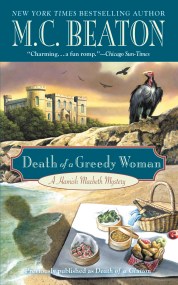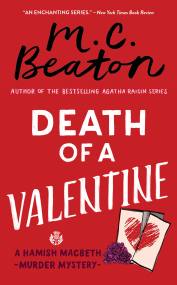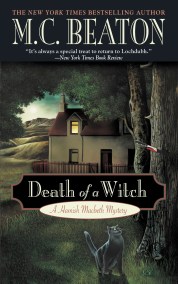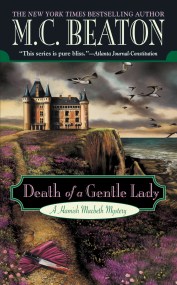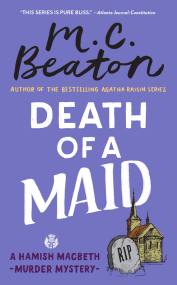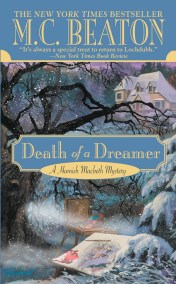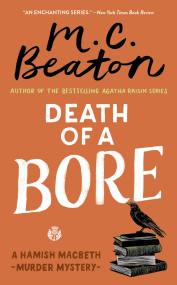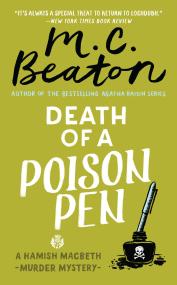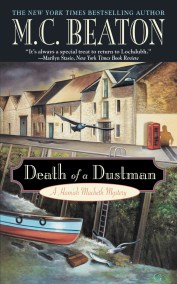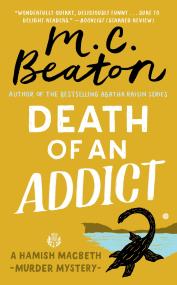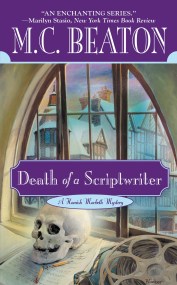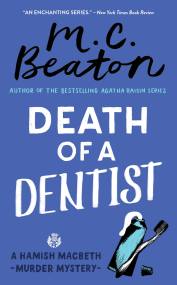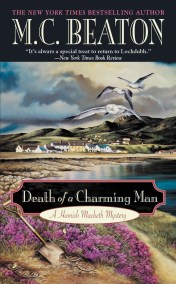Death of a Traitor
Contributors
By M. C. Beaton
With R.W. Green
Formats and Prices
Price
$8.99Price
$11.99 CADFormat
Format:
Also available from:
Kate Hibbert is all too eager to lend a hand to her neighbors. Although she has been a resident of the sleepy village of Lochdubh for only a year, in that time Kate has alienated one too many of its residents with her interfering—and not entirely well-intentioned—ways. When Kate’s neighbor sees her lugging a heavy suitcase to the bus stop, he hopes that the prying woman is leaving for good. But two weeks later, Kate’s cousin arrives in town with the news that Kate has gone missing—and she demands that the local police step in.
Sergeant Hamish Macbeth is called in to investigate the disappearance, and soon he is befuddled by a storm of lies, intrigue, and scandal . . . and the sneaking suspicion that Kate was someone much more sinister than she claimed. Torn between loyalty to Lochdubh and his job, Hamish begins threading his way through a maze of deceit, quickly finding himself on the trail of a ruthless, treacherous murderer. If he catches the killer, peace can return to the village. If he fails, he will lose everything: his job, his home, and the life he so loves in Lochdubh.
Series:
-
"Another pitch-perfect entry in the long-running Hamish Macbeth series . . . capturingBooklist
Beaton’s deft plotting, shrewd characterizations, and loving depictions of the Scottish Highlands. . . The plot builds and twists nicely . . . Raise a glass of Hamish’s favored Famous Grouse to this new addition in a worthy series." -
"Longing for escape? Tired of waiting for Brigadoon to materialize? Time for a trip to Lochdubh, the scenic, if somnolent, village in the Scottish Highlands where M. C. Beaton sets her beguiling whodunits featuring Constable Hamish Macbeth."New York Times Book Review
-
"Beaton, the grand dame of the cozy mystery genre, passed away in late 2019. Beaton chose her friend and fellow writer Green to continue her Hamish Macbeth and Agatha Raisin mystery series . . . and he delivers the charge most admirably. [Death of a Green-Eyed Monster] maintains Beaton's distinctive voice and includes the usual village eccentrics, loads of Scottish lore, and the light humor that Beaton fans have loved through the years. Most important, the book ends with a teaser that seems to promise more and even wilder adventures for Hamish."Library Journal (Starred Review)
-
"Pays fine tribute to Beaton . . . Beaton and Green do a superb job keeping the red herrings coming and the plot twists jumping out at you until the finale. You’ll just have to strap on your favorite kilt and visit scenic Lochdubh to find out exactly what is going on."Bookreporter on Death of a Green-Eyed Monster
-
"Some terrific comic moments (reminiscent of All Creatures Great and Small) . . . Long live Macbeth, Sergeant of Scotland!"Booklist on Death of a Green-Eyed Monster (Starred Review)
-
"This is R. W. Green’s first outings as the successor to Marion Beaton’s Hamish Macbeth series, and he captures [Macbeth's] charm . . . As in the previous Macbeth books, [Death of a Green-Eyed Monster] deals with human failings. Thanks to the gentle touch of R. W. Green, readers will look forward to spending more time in the future with Hamish as he protects the land and people he loves dearly."New York Journal of Books
- On Sale
- Jan 9, 2024
- Page Count
- 288 pages
- Publisher
- Grand Central Publishing
- ISBN-13
- 9781538746776
Praise
-
“Another pitch-perfect entry in the long-running Hamish Macbeth series . . . capturingBooklist
Beaton’s deft plotting, shrewd characterizations, and loving depictions of the Scottish Highlands. . . The plot builds and twists nicely . . . Raise a glass of Hamish’s favored Famous Grouse to this new addition in a worthy series.” -
“Longing for escape? Tired of waiting for Brigadoon to materialize? Time for a trip to Lochdubh, the scenic, if somnolent, village in the Scottish Highlands where M. C. Beaton sets her beguiling whodunits featuring Constable Hamish Macbeth.”New York Times Book Review
-
“Beaton, the grand dame of the cozy mystery genre, passed away in late 2019. Beaton chose her friend and fellow writer Green to continue her Hamish Macbeth and Agatha Raisin mystery series . . . and he delivers the charge most admirably. [Death of a Green-Eyed Monster] maintains Beaton’s distinctive voice and includes the usual village eccentrics, loads of Scottish lore, and the light humor that Beaton fans have loved through the years. Most important, the book ends with a teaser that seems to promise more and even wilder adventures for Hamish.”Library Journal (Starred Review)
-
“Pays fine tribute to Beaton . . . Beaton and Green do a superb job keeping the red herrings coming and the plot twists jumping out at you until the finale. You’ll just have to strap on your favorite kilt and visit scenic Lochdubh to find out exactly what is going on.”Bookreporter on Death of a Green-Eyed Monster
-
“Some terrific comic moments (reminiscent of All Creatures Great and Small) . . . Long live Macbeth, Sergeant of Scotland!”Booklist on Death of a Green-Eyed Monster (Starred Review)
-
“This is R. W. Green’s first outings as the successor to Marion Beaton’s Hamish Macbeth series, and he captures [Macbeth’s] charm . . . As in the previous Macbeth books, [Death of a Green-Eyed Monster] deals with human failings. Thanks to the gentle touch of R. W. Green, readers will look forward to spending more time in the future with Hamish as he protects the land and people he loves dearly.”New York Journal of Books
A Hamish Macbeth Mystery
WHAT’S INSIDE
CHAPTER 1
The wretch, concentred all in self, Living, shall forfeit fair renown, And, doubly dying, shall go down
To the vile dust, from whence he sprung, Unwept, unhonored, and unsung.
Sir Walter Scott, The Lay of the Last Minstrel
Gregor Mackenzie gazed out over the hillside above Lochdubh, leaning on his cromach walking staff and admiring his sheep grazing contentedly in the late morning sunshine. On a day like today, he mused, with a blue sky and a light breeze breathing the freshest of air across the mountains, gently ruffling the heather in soft purple waves, Sutherland was surely the most beautiful place on the planet. His mood was buoyed by the sound, healthy condition of his flock. He was immensely proud of his prize-winning animals and had a fine selection of lambs almost ready for the big auction at Lairg in September, sure to fetch a handsome price. As though they could read his thoughts, several of the North Country Cheviots turned their white faces towards him, their pensive expressions filled with false wisdom. When Gregor’s border collie, Bonnie, pricked up her ears and raised her head, they immediately returned to their grazing.
“Ha!” Mackenzie let out a soft laugh and reached down to pat his dog. “It’s like they don’t want you to know what it is they’re thinking, lass. Truth be told, I doubt they’re ever thinking anything much.”
It was then that he spotted a movement far below on the track leading to the main road. He immediately recognized the pink coat and hat of Kate Hibbert, the woman who had moved into the glen more than a year before. Her cottage was little more than a hundred yards from his. She was perfectly outlined against the distant view of Lochdubh and she appeared to be struggling with a large suitcase, dragging it down the rutted track.
“Where’s that sly besom off to, eh, Bonnie?” Mackenzie reached into a battered knapsack, quickly laying a hand on his old binoculars without ever taking his eyes off the figure in pink further down the hill. No sooner had he fixed the woman in focus than she disappeared where the track dipped behind a heather-clad mound. He tutted, setting off down the hill to find a spot where he could catch sight of her again when she reappeared, Bonnie trotting at his heels. He’d heard nothing about Hibbert taking a holiday and his day was suddenly cheered by the thought that he might be rid of her for a couple of weeks. Wait, though—what if she were going for good? Man, he’d sink a dram or two of his best whisky to that thought as soon as he got home, no matter what his wife might say about him drinking in the afternoon.
Mackenzie stopped abruptly, his dog almost slamming straight into the backs of his legs. He looked down at the white, petal-like bracts and delicate purple flowers of the avern plants and took a detour off to his left. The avern, some called them cloudberries, marked the edge of boggy ground where he could easily sink up to his knee if he wasn’t careful. Once he had a view of the track and the road running along the loch-side, he raised his binoculars again. The glasses had been part of the trouble the Hibbert woman had created between him and his wife, Clara. He’d always kept the binoculars for spotting otters, or maybe an osprey, out on the water but Hibbert had told Clara she’d seen him spying on the women aboard the tourist yachts that came into the loch in the summer. Well, on warm days they were in bikinis—sometimes even topless. What was so wrong with taking a wee peek? That, of course, wasn’t how Clara saw it.
He scanned the track and the road, waiting for Hibbert to reappear, musing over the problems she had caused. She’d interfered when it came to the peat. Clara had a fine, strong back on her and was well able to carry a sackload of peat down the brae to their cottage from where they cut it further up the hill. Hibbert had insisted on helping, always cheerful, always smiling but always bleating about what heavy work it was and how “poor Clara shouldn’t have to lug all that peat around.” Clara never complained, but Hibbert kept on about it until, in the end, he’d been forced to agree that Clara shouldn’t be carrying the peat and that he needed to do something about it. He bought Clara a peat barrow.
Even then, Hibbert gave him no peace. She was constantly round at their cottage, happily helping Clara to bring in the
washing or clean the windows. She was forever drinking coffee, having lunch with Clara or happening to drop by just as they were about to sit down at teatime, making them feel obliged to invite her to share their evening meal. All the time, she was watching him, always looking for another chance to point out how he was failing his wife. When none came, she would conjure one up, saying things like, “That sofa’s seen better days, has it not, Gregor? Surely Clara deserves a new one?” Gregor hated Hibbert but, while she never claimed they were the best of friends, Clara tolerated her at first. As time went on, however, Gregor could plainly see that Clara was starting to find Hibbert about as welcome as a midge in the bedroom on a warm night.
Things came to a head when Clara arrived home from doing some shopping at Patel’s little supermarket down in Lochdubh to find the woman in their house, going through their mail and the old ledger where they kept their accounts.
“Aye, that was a grand day, Bonnie,” Gregor said softly, the binoculars pressed tight against his eyes. “We were rebuilding the dyke all the way up in the top pasture, weren’t we? We could hear Clara going mental even from there—such language as I’ve never before heard from her. She was right ashamed of the blasphemy afterwards. Attended the kirk every Sunday morning for a month. The bloody Hibbert woman steered well clear of us after that. But where has she got to now, eh?”
Mackenzie had a clear view of the track and the road but there was no sign of the woman in pink. Making his way down the slope, he took a look behind the mound that had obscured his view only to find the track deserted. He ran a hand over the greying stubble on his chin, shrugged and turned to head for home, itching to tell Clara he had seen that damned woman leaving their glen. With any luck, they’d heard the last of her.
